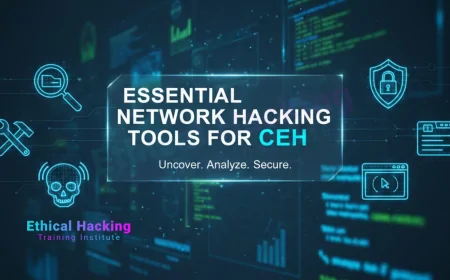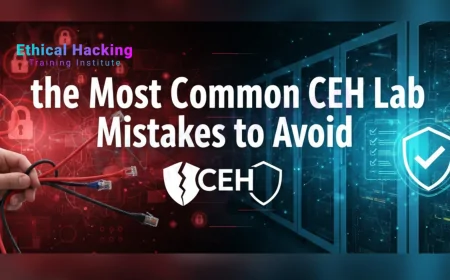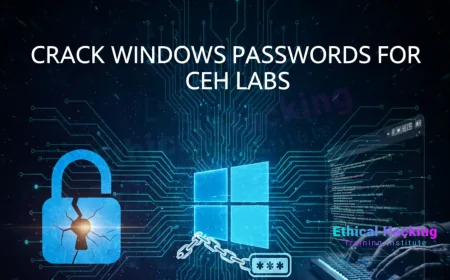Find CEH Classes Near You: Local Options for Certified Ethical Hacker Training | Enroll in CEH Classes Near You: Local Training Options for Ethical Hacking
Discover CEH classes near you! Explore local Certified Ethical Hacker training options with expert guidance, real labs, and career-ready certification in 2025.

Table of Contents
- Introduction
- What is CEH (Certified Ethical Hacker)?
- Why Choose Local CEH Classes?
- Benefits of In-Person CEH Training
- Types of CEH Training Centers
- How to Find CEH Classes Near You
- What to Look for in a CEH Institute
- Certified Ethical Hacker Course Curriculum
- CEH Certification Process Explained
- Cost of Local CEH Training
- Top Cities for CEH Training in India
- CEH v13 Exam Format & Details
- Who Should Take the CEH Course?
- CEH vs Other Cybersecurity Certifications
- Job Placement & Career Support
- Hybrid CEH Options (Online + Local)
- Preparing for Your CEH Exam
- CEH Renewal & Continuing Education
- FAQs
- Conclusion
Introduction
As cybersecurity threats grow more sophisticated, the demand for skilled professionals capable of defending digital assets is at an all-time high. Among the most respected credentials in the industry is the CEH – Certified Ethical Hacker certification, issued by EC-Council. If you're seeking local CEH classes, this guide will help you discover the best in-person training near you and what to expect from a CEH course.
What is CEH (Certified Ethical Hacker)?
The Certified Ethical Hacker (CEH) is a globally recognized cybersecurity certification offered by the EC-Council (International Council of E-Commerce Consultants). It validates a professional’s ability to think and act like a hacker—but with legal and ethical intent.
Ethical hackers, also known as white-hat hackers, are hired by organizations to identify and fix vulnerabilities in their systems before malicious hackers can exploit them.
Key Highlights of CEH:
1. MITRE ATT&CK Framework Integration
2. New Cloud, IoT & OT Modules
3. Hands-On Labs via CEH Practice Environment (iLabs)
4. Hacking Challenge + CTF-style Assessments
5. 11 Cyber Kill Chain Stages
6. CEH v13 Exam Structure
7. Structured Learning Path
8. Learning Modes Available
9. Job-Ready Training
10. Aligned with DoD 8140/8570
Why CEH Matters:
-
Builds a strong foundation in ethical hacking techniques
-
Helps in landing roles like Penetration Tester, SOC Analyst, Security Engineer
-
Required or preferred by many cybersecurity job roles and government agencies
Why Choose Local CEH Classes?
-
Face-to-face learning from certified instructors
-
Access to local training labs and infrastructure
-
Better discipline through structured classroom environments
-
Networking opportunities with nearby professionals
Benefits of In-Person CEH Training
| Benefit | Description |
|---|---|
| Live Interaction | Ask questions and get real-time feedback |
| Lab Access | Practice hacking on secured systems |
| Certified Trainers | Learn from EC-Council-certified professionals |
| Peer Learning | Group discussions and teamwork |
| Structured Schedule | More focus and less procrastination |
Types of CEH Training Centers
-
EC-Council Accredited ATCs (Authorized Training Centers)
-
Private Cybersecurity Institutes
-
University Extension Programs
-
Corporate Learning Hubs
-
Government-Backed Skill Centers (e.g., NSDC-certified)
How to Find CEH Classes Near You
-
Use the EC-Council ATC locator tool.
-
Search Google Maps with terms like "CEH classes near me".
-
Explore local listings on Justdial, Sulekha, and UrbanPro.
-
Visit forums such as Reddit r/netsecstudents for personal reviews.
-
Ask for referrals in local tech or cybersecurity communities.
What to Look for in a CEH Institute
-
EC-Council accreditation
-
Experienced trainers (CEH, OSCP, CISSP certified)
-
Hands-on lab availability
-
Exam voucher inclusion
-
Placement assistance and post-training support
-
Reviews and alumni feedback
Certified Ethical Hacker Course Curriculum
CEH v13 consists of 20 comprehensive modules, aligned with the MITRE ATT&CK framework, and includes hands-on labs, real-world scenarios, and exam-focused preparation.
CEH v13 Modules Overview
| Module Name |
|
|
|---|---|---|
| Introduction to Ethical Hacking | Basics of ethical hacking, threat landscape, and hacker types (white/black/gray hats). | |
| Footprinting and Reconnaissance | Active & passive recon, footprinting tools, and countermeasures. | |
| Scanning Networks | Network scanning techniques: ping sweeps, port scanning, Nmap, vulnerability scanning. | |
| Enumeration | Extracting usernames, group info, SNMP data, and NetBIOS enumeration. | |
| Vulnerability Analysis | Finding system weaknesses using tools like OpenVAS and Nessus. | |
| System Hacking | Gaining and maintaining access, privilege escalation, covering tracks. | |
| Malware Threats | Viruses, worms, Trojans, ransomware, keyloggers, and malware analysis techniques. | |
| Sniffing | Packet sniffing using Wireshark, MITM attacks, and counter-sniffing. | |
| Social Engineering | Human-based attacks including phishing, impersonation, and pretexting. | |
| Denial-of-Service (DoS) | DoS and DDoS attack techniques, botnets, detection, and prevention. | |
| Session Hijacking | Stealing session IDs, cookie manipulation, and defense mechanisms. | |
| Evading IDS, Firewalls, and Honeypots | Firewall evasion, packet crafting, and detection avoidance. | |
| Hacking Web Servers | Exploiting HTTP servers, misconfigurations, and patch bypassing. | |
| Hacking Web Applications | SQL injection, XSS, CSRF, directory traversal, and input validation. | |
| SQL Injection | Identifying and exploiting SQLi vulnerabilities in apps and databases. | |
| Hacking Wireless Networks | WEP/WPA/WPA2 attacks, rogue APs, and Wi-Fi cracking tools. | |
| Hacking Mobile Platforms | Android and iOS vulnerabilities, mobile malware, and reverse engineering. | |
| IoT and OT Hacking | Targeting Internet of Things and Operational Tech environments. | |
| Cloud Computing | Cloud attack vectors, misconfiguration exploitation, and container security. | |
| Cryptography | Encryption techniques, cryptanalysis, hashing, and secure protocols. |
CEH v13 Practical Labs (iLabs)
Each module includes:
-
Hands-on labs using real tools
-
Simulated attack environments
-
Cloud-hosted virtual machines
-
Lab tasks like exploiting CVEs, cracking hashes, intercepting traffic
CEH v13 Learning Outcomes
After completing the curriculum, learners will:
-
Understand the ethical hacking lifecycle
-
Be able to analyze and exploit vulnerabilities
-
Use industry tools like Nmap, Metasploit, Wireshark, Burp Suite
-
Prepare confidently for the CEH v13 exam and practical assessment
-
Be job-ready for entry to mid-level cybersecurity roles
CEH Certification Process Explained
-
Complete Training (5 days or 40+ hours)
-
Receive Eligibility Code from EC-Council
-
Book CEH Exam (ECC Exam or Pearson VUE)
-
Attempt 125 MCQs in 4 Hours
-
Pass with ≥ 70% to get CEH Certified
Cost of Local CEH Training
| Location Type | Estimated Price (INR) |
|---|---|
| Metro City ATC | ₹60,000 – ₹90,000 |
| Tier-2 City Institutes | ₹40,000 – ₹70,000 |
| University/College | ₹25,000 – ₹50,000 |
| With Certification Voucher | Extra ₹10,000 – ₹15,000 |
Tip: Always confirm if the fee includes the exam voucher and lab access.
Top Cities for CEH Training in India
-
Pune
-
Bengaluru
-
Hyderabad
-
Chennai
-
Delhi NCR
-
Mumbai
-
Ahmedabad
-
Kolkata
CEH v13 Exam Format & Details
-
Format: Multiple Choice Questions
-
Total Questions: 125
-
Duration: 4 hours
-
Passing Score: 60%–85% (adaptive scoring)
-
Exam Body: EC-Council / Pearson VUE
Who Should Take the CEH Course?
-
IT Students & Graduates
-
Network Administrators
-
System Engineers
-
Cybersecurity Enthusiasts
-
Professionals switching to InfoSec roles
CEH vs Other Cybersecurity Certifications
| Certification | Level | Focus |
|---|---|---|
| CEH | Intermediate | Ethical hacking basics |
| OSCP | Advanced | Offensive penetration |
| CISSP | Expert | Security architecture |
| Security+ | Entry-level | IT security fundamentals |
Job Placement & Career Support
Many local institutes offer:
-
Resume-building workshops
-
Interview preparation
-
Internship opportunities
-
Recruiter connections
-
Direct hiring partnerships
Hybrid CEH Options (Online + Local)
Some training centers provide:
-
Live online classes + in-person lab sessions
-
Weekend classroom batches + weekday e-learning
-
Exam from home + physical training
Preparing for Your CEH Exam
-
Read the official EC-Council CEH v13 Manual
-
Use practice exams and dumps wisely
-
Set up a home lab using Kali Linux and VirtualBox
-
Participate in TryHackMe, Hack The Box, or Cyber Range challenges
CEH Renewal & Continuing Education
-
CEH is valid for 3 years
-
Requires 120 ECE credits for renewal
-
Can be maintained via webinars, conferences, or new certifications
FAQs -
1. What is the CEH certification?
The Certified Ethical Hacker (CEH) is a credential offered by EC-Council that verifies your skills in ethical hacking and cybersecurity.
2. Is CEH certification recognized globally?
Yes, CEH is one of the most recognized certifications in the cybersecurity industry worldwide.
3. Where can I find CEH classes near me?
You can find classes via EC-Council's website, Justdial, UrbanPro, and local IT training institutes.
4. How long does CEH training take?
The typical training duration is 5 days full-time or 40+ hours spread over several weeks.
5. Is the CEH exam difficult?
The exam is moderate in difficulty and requires good preparation in theory and hands-on labs.
6. What is the cost of CEH training in India?
It ranges between ₹40,000 to ₹90,000 depending on the city and training provider.
7. Is there any prerequisite for CEH?
There are no strict prerequisites, but knowledge of networking and Linux is helpful.
8. What version of CEH is current in 2025?
CEH v13 is the most current and includes hands-on labs and practical assessments.
9. Do local institutes offer CEH exam vouchers?
Many do, but always confirm whether it's included in the course fee.
10. Can I get a job after CEH?
Yes, CEH certification significantly increases your chances of landing cybersecurity jobs.
11. What job roles can CEH lead to?
Penetration Tester, Security Analyst, SOC Analyst, Ethical Hacker, etc.
12. Is CEH better than OSCP?
CEH is good for beginners; OSCP is better for advanced penetration testers.
13. Does CEH require programming knowledge?
Not mandatory, but knowing Python and Bash is beneficial.
14. Are CEH classes available on weekends?
Yes, many centers offer weekend-only batches for working professionals.
15. Will I get hands-on experience?
Yes, CEH v12 includes lab-based practical sessions.
16. What if there are no CEH classes in my city?
You can opt for live online classes or hybrid programs that offer remote training.
17. Is the CEH certification exam proctored?
Yes, it can be taken via proctored online systems or at authorized test centers.
18. Can I renew my CEH certification?
Yes, you must earn 120 ECE credits every three years to renew it.
19. Do CEH classes provide placement support?
Many local institutes offer placement assistance, resume help, and interview preparation.
20. Is CEH suitable for freshers?
Yes, freshers with an interest in cybersecurity can start with CEH for a strong foundation.
Conclusion
Getting CEH certified opens the door to a career in cybersecurity and ethical hacking. Local CEH classes provide a more immersive learning experience with expert mentors, real labs, and a disciplined structure. Whether you're in Pune, Delhi, or a small town, make sure to choose an EC-Council accredited institute with good infrastructure and industry connections. Begin your ethical hacking journey today with the right CEH training center near you.
What's Your Reaction?
 Like
0
Like
0
 Dislike
0
Dislike
0
 Love
0
Love
0
 Funny
0
Funny
0
 Angry
0
Angry
0
 Sad
0
Sad
0
 Wow
0
Wow
0

















